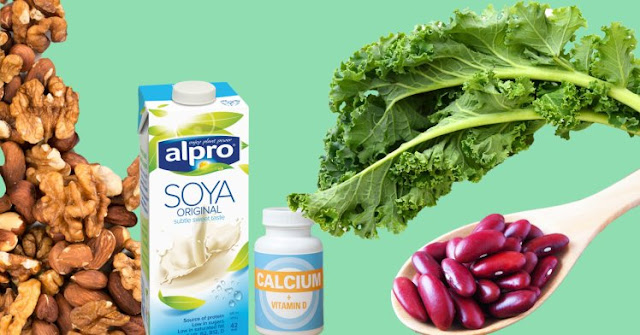How to make sure you get enough calcium even if you don’t eat dairy
National Osteoporosis Society made a survey and has found that 40% of young adults have tried diets in which they cut out dairy, gluten, grain and sugar, and more than a fifth had severely restricted their intake of milk and cheese.
Probably be to assume from these findings that a vegan diet is bad for you. If you have lactose intolerance or a cow’s milk allergy, you might also be worried that you’ll develop osteoporosis.
However, this really isn’t the case.
So-called ‘clean eating’ is the avoidance of all processed foods, whilst veganism – as far as food is concerned – is simply following a plant-based diet, avoiding all animal products. This can (and often does) include a lot of processed food and in fact a lot of vegan staples, such as almond and soya milks, would be shunned by clean eaters because they are processed.
So the question is: how do you navigate this minefield? What if you want to avoid cruelty to animals, but don’t want to sacrifice your bones?
Luckily, it’s pretty straightforward. Here are some alternative sources of bone-healthy vitamins, so you can look after yourself even if you’re vegan or lactose intolerant.
What do you need to keep your bones healthy?
Calcium, calcium, calcium.
Calcium is a big player when it comes to your bone health – but it’s not the only thing.
While Vitamin D is also crucial for good bone health, as are vitamins K, protein and potassium.
For the best possible bone health, you need a combination of all of these.
But is it just about eating loads of calcium?
No not really. You should also try and avoid sources of calcium that are bound to a substance called ‘oxalate’, which actually hinders calcium absorption.
And cow’s milk is very high in calcium, it is also not that easily absorbed in the human body.
This actually makes many low-oxalate vegetables, such as rocket, cabbage and kale, as good as animal milks when it comes to calcium absorption.
You should also avoid eating too much salt and caffeine – both of which have been shown to inhibit calcium uptake.
So where can you get easily-absorbed calcium?
ROCKET, CABBAGE, BROCCOLI, KALE, BEANS…
Low-oxalate vegetables are a great shout for vegan calcium sources.
If the term ‘low-oxalate vegetables’ puts you off, just think: green and leafy veg.
This includes spring greens, kale, broccoli and cabbage – which are all great sources of calcium, as well as vitamin K.
Similarly, red kidney beans and black-eyed beans are surprisingly good sources of calcium.
A 100g serving of red kidney beans contains around 8% of your RDA (recommended daily allowance) of calcium.
However, you can leave spinach and chard off this list, as they’re both high in oxalates. (They are, however, great sources of iron – so keep them on your plate.)
FORTIFIED FOODS LIKE PLANT MILKS AND TOFU
Most plant milks that you can buy in shops are fortified with vitamins B12, B2 and D, and are very good sources of calcium.
It’s now possible to buy milk made from soya, almonds, cashews, oats, coconuts, rice, or even hemp. They all have different textures, tastes and consistencies, so you can find the one you like the best.
Same goes for soya and coconut yoghurt, almond milk ice cream, and soya cream.
Tofu is another good source of calcium – especially when the brand uses calcium sulphate as a coagulant. This is known as ‘calcium-set tofu’.
(For background, tofu is made using soya beans, water, and a ‘coagulant’ – a curdling agent.)
While it depends on the specific brand of tofu you’re buying, most mainstream brands are calcium-set.
In fact, you only need 33g of tofu to get 100mg of calcium – 10% of your RDA.
NUTS (ESPECIALLY ALMONDS)
Nuts – almonds in particular – are also a really good source of calcium. A 42g serving can get you 10% of your calcium RDA.
If you’re buying almond milk, even better.
CHICKPEAS AND TAHINI
Yum. A 217g serving of boiled chickpeas gets you 100mg of calcium – again, around 10% of your RDA. Cook them with some fortified plant milk or soya cream to make a creamy Indian channa curry.
Or, alternatively, stick them in a blender with some olive oil, parsley, green chillis and tahini – an incredible source of calcium – to make hummus.
You only need a small 15g serving of tahini to get 10% of your RDA of calcium, so heap a couple of tablespoons in to make your hummus nice and creamy – and calcium-rich.
CALCIUM SUPPLEMENTS
This one is pretty obvious.
If you’re still concerned that you’re not getting enough calcium in your diet, make sure you take supplements.
It’s easy to buy combination calcium and vitamin D tablets, which are aimed specifically at bone health.
So if I get enough calcium then I won’t get osteoporosis?
Not necessarily.
Osteoporosis is hereditary – meaning it can be inherited genetically – so if you have a family history of osteoporosis or osteomalacia, you should keep an eye on your health regardless of your diet.










Post a Comment